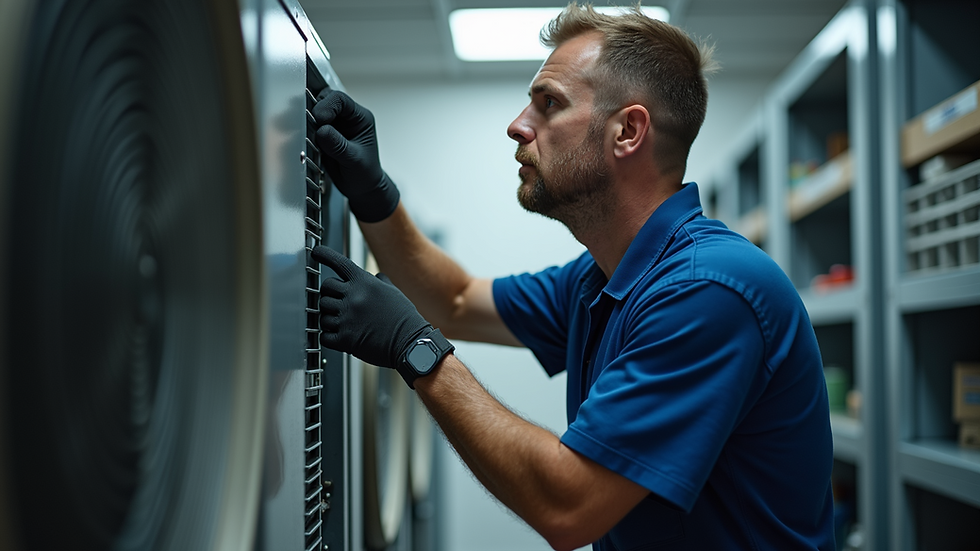Simple Steps to Keep Your AC Running Smoothly
- VHP Air Conditioning & Heating

- Oct 20, 2025
- 4 min read
Keeping your air conditioner in top shape is crucial for comfort, energy efficiency, and avoiding costly repairs. Whether you rely on your AC during hot summer months or year-round, regular care can extend its lifespan and improve performance. This guide will walk you through simple, practical steps to keep your AC running smoothly all year long.
Why Regular AC Maintenance Matters
An air conditioner is a complex system with many parts working together to cool your home. Over time, dust, dirt, and wear can reduce its efficiency and cause breakdowns. Regular maintenance helps:
Improve cooling efficiency: Clean components allow the AC to cool faster and use less energy.
Extend equipment life: Preventing damage and wear means your AC lasts longer.
Reduce energy bills: A well-maintained unit consumes less electricity.
Avoid costly repairs: Early detection of issues can save you from expensive fixes.
Enhance indoor air quality: Clean filters and coils reduce allergens and dust.
By investing a little time and effort, you can enjoy a comfortable home without unexpected interruptions.

Easy AC Maintenance Tips You Can Do Yourself
You don’t need to be an HVAC expert to perform basic upkeep on your air conditioner. Here are some simple steps you can take to keep your system in good shape:
1. Change or Clean the Air Filter Regularly
The air filter traps dust, pollen, and debris before they enter the system. A clogged filter restricts airflow, forcing the AC to work harder.
Check the filter every month during heavy use.
Replace disposable filters every 1-3 months.
Clean reusable filters with water and let them dry completely before reinstalling.
2. Keep the Outdoor Unit Clear
The outdoor condenser unit needs plenty of airflow to release heat.
Remove leaves, grass, and debris around the unit.
Trim plants and bushes at least 2 feet away.
Gently hose off dirt and dust from the fins, but avoid bending them.
3. Inspect and Clean the Evaporator and Condenser Coils
Dirty coils reduce the system’s ability to absorb and release heat.
Check coils annually.
Use a soft brush or coil cleaner to remove buildup.
If coils are heavily soiled, consider professional cleaning.
4. Check the Drain Line and Pan
The drain line removes condensation from the system. If clogged, water can back up and cause damage.
Inspect the drain pan for standing water.
Clear the drain line with a wet/dry vacuum or a pipe cleaner.
Pour a cup of bleach or vinegar down the drain line to prevent mold.
5. Monitor the Thermostat Settings
Ensure your thermostat is working correctly and set to an efficient temperature.
Use programmable thermostats to save energy.
Avoid setting the temperature too low, which strains the system.
These simple steps can prevent many common AC problems and keep your system running efficiently.

What Regular Maintenance Should Be Done on an Air Conditioner?
Beyond the basic tasks you can do yourself, some maintenance requires professional attention to ensure your AC operates safely and efficiently.
Annual Professional Inspection
Schedule a yearly tune-up with a licensed HVAC technician. They will:
Check refrigerant levels and recharge if necessary.
Inspect electrical connections and tighten any loose wires.
Test system controls to ensure proper cycling.
Lubricate moving parts to reduce friction.
Measure airflow and adjust as needed.
Examine ductwork for leaks or blockages.
Cleaning and Replacing Components
Technicians can perform deep cleaning of coils, blower components, and other parts that are hard to reach. They can also replace worn-out parts before they cause system failure.
Safety Checks
A professional will check for potential hazards such as refrigerant leaks or electrical issues that could pose risks.
Regular professional maintenance complements your own efforts and helps catch problems early.

Signs Your AC Needs Immediate Attention
Even with regular care, your AC might show signs of trouble. Watch for these warning signals:
Weak or no airflow: Could indicate a clogged filter, blower issue, or duct problem.
Warm air blowing: May mean refrigerant leak or compressor failure.
Strange noises: Grinding, squealing, or rattling sounds suggest mechanical problems.
Foul odors: Mold or burnt wiring smell requires immediate inspection.
High energy bills: Sudden spikes can indicate inefficiency or malfunction.
If you notice any of these, contact a professional promptly to avoid further damage.
Tips to Maximize Your AC’s Lifespan
In addition to maintenance, adopting good usage habits can help your AC last longer:
Use ceiling fans to circulate air and reduce AC load.
Close curtains or blinds during peak sunlight hours.
Seal windows and doors to prevent cool air from escaping.
Avoid setting the thermostat too low.
Turn off the AC when you’re away for extended periods.
By combining these habits with regular upkeep, you’ll enjoy reliable cooling and lower energy costs.
For more detailed guidance, check out these ac maintenance tips to keep your system in peak condition.
Taking care of your air conditioner doesn’t have to be complicated. With these simple steps and a little attention, you can ensure your AC runs smoothly, keeps you comfortable, and saves you money for years to come.





